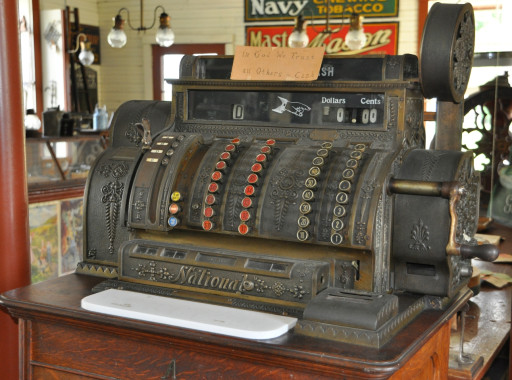Ledger.8.jpg

Cash register, Hodge's Store.
The hand-written sign on the register states: "In God we trust; in all other cash." Paying one's debt in the stores of Missisquoi Bay could be settled in a number of ways. Promissory notes were popular with the wealthier citizens but most people utilized the barter system and paid with an exchange of goods or by committing themselves to labour. Items exchanged for goods purchased were all carefully recorded and had a specific cash value. Beef and pork, milk and cheese, eggs, fresh produce and leaf tobacco were the most popular goods exchanged in the barter system. Labour in return for goods purchased tended to be haying, ploughing and mowing, shoe making, carting logs and lumber, horse shoeing, road making and surveying, mill dam work and weaving. Customers working for Philip Luke for example, customarily mended fences, made clothing, dug potatoes, or worked in his ashery which was a thriving business in the community.(Missisquoi Historical Society Collections)
The hand-written sign on the register states: "In God we trust; in all other cash." Paying one's debt in the stores of Missisquoi Bay could be settled in a number of ways. Promissory notes were popular with the wealthier citizens but most people utilized the barter system and paid with an exchange of goods or by committing themselves to labour. Items exchanged for goods purchased were all carefully recorded and had a specific cash value. Beef and pork, milk and cheese, eggs, fresh produce and leaf tobacco were the most popular goods exchanged in the barter system. Labour in return for goods purchased tended to be haying, ploughing and mowing, shoe making, carting logs and lumber, horse shoeing, road making and surveying, mill dam work and weaving. Customers working for Philip Luke for example, customarily mended fences, made clothing, dug potatoes, or worked in his ashery which was a thriving business in the community.(Missisquoi Historical Society Collections)